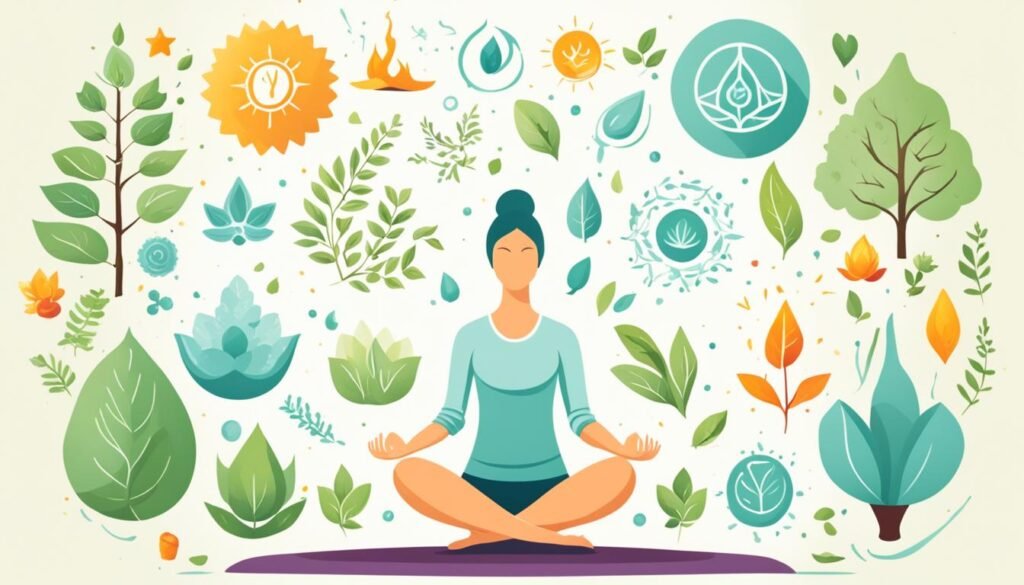In the pursuit of a gratifying existence, one must endeavor to achieve a state of equilibrium that encompasses the mind, body, and soul. Holistic wellness practices transcend mere physical health, encompassing mental and emotional well-being as well. The expedition toward a balanced life is multifaceted, yet the rewards are boundless. In this comprehensive article, we shall delve into transformative holistic wellness practices that can facilitate the attainment of harmony and lead to a more enriched life covering all 8 pillars of holistic wellness i.e., physical, emotional, mental, social, spiritual, environmental, occupational, and intellectual well-being. Drawing upon first-hand experiences and reputable sources, we shall explore these practices, offering expert insights to foster overall well-being.
Introduction to Holistic Wellness
In the pursuit of a balanced and fulfilling life, the concept of holistic wellness has emerged as a transformative approach. Holistic wellness transcends the mere physical aspect of health, encompassing the intricate interplay between the mind, body, and spirit. It is an integrated approach to well-being that considers the interconnectedness of all facets of an individual’s life, including physical, emotional, mental, social, spiritual, environmental, occupational, and intellectual well-being.
What is Holistic Wellness?
Holistic wellness is a comprehensive philosophy that recognizes the mind-body-spirit connection as the foundation for optimal health and fulfillment. It emphasizes the importance of maintaining a state of equilibrium across all dimensions of an individual’s life. By embracing holistic wellness practices, one can cultivate a more balanced and enriched life, fostering harmony, personal growth, and an enhanced sense of overall well-being.
The Importance of a Balanced Life
The expedition toward a balanced life is multifaceted, yet the rewards are boundless. When individuals nurture a holistic approach to wellness, they unlock the potential for profound transformation. This journey encompasses the integration of physical, emotional, mental, and spiritual well-being, empowering individuals to navigate life’s challenges with resilience and grace. By prioritizing self care vision and incorporating holistic wellness practices into their daily routines, individuals can unlock a profound sense of harmony, fostering a more enriched and fulfilling existence.
Mindfulness Meditation: Embracing the Present Moment
Mindfulness meditation is an art that entails bestowing undivided attention upon the present moment without prejudgment. Regular engagement in this mindfulness meditation practice allows one to experience profound serenity and relaxation. Empirical evidence demonstrates that mindfulness meditation can ameliorate symptoms of anxiety, depression, and stress. Moreover, it nurtures heightened focus and attention, augments self-awareness, and fosters emotional regulation.
Benefits of Mindfulness Meditation
Research suggests that regular mindfulness meditation practice can help lower blood pressure, reduce chronic pain, and strengthen the immune system. Mindfulness has been shown to improve mental clarity and concentration, enhancing productivity and efficiency. Practicing mindfulness can also lead to improved emotional well-being by increasing self-compassion and self-acceptance. Mindful living can enhance relationships and communication skills, fostering deeper connections and understanding.
Getting Started with Mindfulness Meditation
To initiate this journey, seek a serene space, assume a comfortable posture, and direct your focus to your breath. As thoughts emerge, gently steer your attention back to your breath. Gradually, an enhanced capacity to remain centered and present in daily activities will become evident. One way to start practicing mindfulness in everyday life is by bringing awareness to daily routines, such as sipping coffee or walking to work. Mindfulness breaks throughout the day, like taking deep breaths or appreciating nature, can also help reset and recharge the mind.
Cultivating mindfulness in daily life is about being fully present and engaged in the current moment without judgment or attachment. The practice of mindfulness allows individuals to let go of regrets and anxieties about the past and future, leading to finding peace and fulfillment in the present moment. The practice of self-compassion and mindfulness are powerful tools for releasing regret and anxiety.
Yoga: Uniting Mind, Body, and Spirit
Originating from ancient India, yoga has garnered global acclaim for its holistic approach to well-being. It encompasses a repertoire of physical postures (asanas) and breathing exercises (pranayama) that harmonize the body, mind, and spirit. Regular yoga practice enhances flexibility, strength, and balance while mitigating muscle tension and promoting relaxation. Beyond physical benefits, yoga stimulates self-awareness and introspection, nurturing a profound connection with one’s inner self. Whether a novice or a seasoned practitioner, various styles and levels of yoga classes cater to individual preferences.
Yoga predates written history and has been found in stone carvings dating back 5,000 years in the Indus Valley. It was formally introduced in the West during the early 19th century and became popular in the 1930s as part of a movement for health and vegetarianism. Patanjali’s Yoga Sutra, written around the second century, outlines the Eight Limbs of Yoga, including Yama, Niyama, Asana, Pranayama, Pratyahara, Dharana, Dhyana, and Samadhi. The Bhagavad-Gita, created around 500 BC, focuses on the importance of opposing evil and unity through loving devotion (Bhakti), knowledge (Jnana), and selfless actions (Karma).
The Vedas contain the oldest known teachings of Yoga, called Vedic Yoga, characterized by rituals and ceremonies to surpass the limitations of the mind. The Upanishads, created around 400 BCE, describe the inner vision of reality through devotion to Brahman, the ultimate reality. Post-classical Yoga, after the Classical Period, teaches acceptance and living in the present moment rather than striving to liberate from reality.
Specific styles of yoga include Ashtanga (Power Yoga), Bikram (Hot Yoga), Hatha Yoga, and Integral Yoga, each offering unique benefits and intensities. Yoga classes typically range in duration from 45 to 90 minutes and encompass breath, pose, and meditation components. Research indicates that yoga fosters mindfulness techniques, reduces stress and anxiety, increases mental and physical strength, balance, and flexibility, and enhances emotional regulation techniques.
Journaling: Liberating Inner Thoughts
Journaling is a powerful tool for self-expression and self-discovery. Transcribing thoughts and emotions onto paper unveils insights into one’s inner world, reveals patterns, and facilitates the resolution of challenging emotions. Maintaining a journal serves as an emotional catharsis, unburdening the mind of thoughts that might otherwise weigh it down. Additionally, it serves as a platform for setting objectives, expressing gratitude, and chronicling personal growth.
The Benefits of Journaling
Research has shown that journaling can enhance self-reflection and cognitive restructuring, contributing to improved self-understanding and better emotional regulation (Smyth & Helm, 2003; Ullrich & Lutgendorf, 2002). Individuals who engage in daily self-reflection through journaling may build a bridge between past experiences and present emotions, fostering growth and adaptive coping strategies (Morin, 2011). Furthermore, adults who reported a clear sense of meaning through self-discovery techniques exhibited greater psychological well-being and were better equipped to handle life’s stressors (Steger et al., 2006). Cultivating mindfulness, gratitude, and self-love through journaling practices can lead to improved life satisfaction and overall well-being (Emmons & McCullough, 2003; Neff & Vonk, 2009).
Tips for Starting a Journaling Practice
Consider journaling as a regular practice, either to set intentions in the morning or reflect on experiences in the evening. Engaging in structured journal prompts can act as beacons, guiding individuals through emotional turbulence and facilitating the release of pent-up feelings for catharsis. The act of writing down thoughts and emotions provides a tangible way of exploring and learning from one’s inner child, leading to profound healing and transformation, and contributing to a more harmonious, joyful, and meaningful life.
Holistic Nutrition: Nourishing the Body
Holistic nutrition underscores the significance of nourishing the body with wholesome, nutrient-dense sustenance. Embrace a balanced diet replete with an assortment of fruits, vegetables, whole grains, lean proteins, and healthy fats. Abstain from highly processed and sugary foods, as they instigate energy fluctuations and adversely impact overall well-being. Adopting a holistic approach to nutrition fortifies the immune system, bolsters digestive health, and fosters a healthy weight.
The Principles of Holistic Nutrition
Holistic nutrition emphasizes individual uniqueness and comprehensive nutritional needs, encompassing physical, emotional, mental, and spiritual aspects of health. Organic health products are essential in holistic nutrition to avoid harmful chemicals and pesticides. Platforms like Healthy U in Kenya offer a variety of carefully curated organic products to support a holistic lifestyle.
Healthy Food Choices for a Balanced Diet
Holistic nutrition accommodates various health goals such as weight loss, bodybuilding, and overall vitality. Healthy U in Nairobi provides weight loss products and supplements aligned with these health goals. Superfoods like ashwagandha, a popular adaptogen, are nutrient-dense and offer numerous health benefits. Hydration is vital in holistic nutrition, with healthy drink options like herbal teas, infused water, and natural fruit juices.
Holistic nutrition involves self-discovery, self-care, and nourishment for the body, mind, and spirit. Bodybuilding stores in Kenya offer high-quality supplements and products for proper nutrition and muscle recovery. By embracing a holistic approach to nutrition, individuals can cultivate a balanced and thriving lifestyle.
Emotional Intelligence: Mastering Emotions
Emotional intelligence (EI) denotes the adeptness to recognize, comprehend, and regulate one’s emotions effectively. Cultivating emotional intelligence entails heightened awareness of personal feelings and reactions, coupled with empathy and sensitivity to the emotions of others. The development of emotional intelligence elevates interpersonal relationships, augments effective communication, and engenders grace in managing stressful circumstances. Moreover, EI plays a pivotal role in self-regulation, averting impulsive behaviors, and promoting prudent decision-making.
Understanding Emotional Intelligence
Self-awareness is the foundational pillar of emotional intelligence, allowing individuals to recognize and understand their own emotions, strengths, weaknesses, and how they affect behavior. Effective communication is at the core of leadership, with leaders high in emotional intelligence conveying their thoughts clearly, listening actively, and making others feel heard and valued. Resilience is your ability to bounce back from setbacks and adversity, helping individuals handle stress, overcome obstacles, and adapt to change.
Developing Emotional Intelligence
Emotional intelligence equips individuals with skills to manage conflicts constructively, involving staying calm under pressure, actively listening to others’ perspectives, compromising, and finding win-win solutions. Developing emotional intelligence is an ongoing journey involving self-awareness, self-reflection, emotional regulation, seeking feedback from peers, and practicing empathy. Various tools and assessments are available to measure one’s emotional intelligence, providing insights into strengths and areas for growth.

self care vision: Acknowledging Life’s Bounties
Holistic wellness practices like gratitude practice entail purposefully acknowledging and appreciating the positive facets of life. It could be as simple as a daily moment of gratitude for people, experiences, or possessions that evoke joy and fulfillment. Research attests that a regular gratitude practice augments happiness, mitigates stress, and enhances overall well-being. Consider maintaining a gratitude journal or incorporating gratitude affirmations into daily routines to cultivate a more optimistic outlook on life.
By focusing on self care vision, individuals can foster a deep sense of abundance and positive mindset, empowering them to navigate life’s challenges with resilience and grace. This holistic approach to well-being encourages us to pause and reflect on the blessings that surround us, ultimately leading to a more fulfilling and balanced existence.
Forest Bathing: Reconnecting with Nature
The Practice of Forest Bathing
Forest bathing, also known as shinrin-yoku, is a Japanese tradition involving immersive communion with nature to enrich well-being. The premise is elemental: immerse oneself in natural surroundings such as forests, parks, or gardens, engaging all senses to connect with the environment. Take the time to savor nature’s beauty, the melodic symphony of chirping birds, the redolence of fresh air, and the sensation of earth beneath your feet.
Benefits of Forest Bathing
Scientific studies affirm that forest bathing diminishes stress hormones, lowers blood pressure, and fortifies the immune system. Researchers found that increased NK cell activity lasts for over thirty days after a three-day forest trip. An awe walk can lead to increased positive emotions and prosocial emotions, while nature can help reset the nervous system, providing more brain-space for creativity and pro-activity.
A Japanese study from 2011 found that leisurely forest walks, compared with urban walks, yield a 12.4 percent decrease in cortisol levels, a seven percent decrease in sympathetic nerve activity, a 1.4 percent decrease in blood pressure, and a 5.8 percent decrease in heart rate. Spending time in nature has been scientifically proven to lower heart rate and blood pressure, reduce stress hormones, boost the immune system, and improve overall wellbeing.
Digital Detox: Unplugging for Mental Clarity
In today’s technology-dominated world, a digital detox holds immense potential for rejuvenation and mental clarity. Excessive screen time engenders digital fatigue, heightened anxiety, and disrupted sleep patterns. Designate specific intervals during the day to disconnect from devices, embracing activities that foster presence and mindfulness. This could encompass reading a book, taking a stroll, or sharing quality moments with loved ones. A reduction in screen time paves the way for a more harmonious and fulfilling existence.

Practical strategies for digital detox include setting boundaries, practicing mindfulness, pursuing offline hobbies, connecting face-to-face, and spending time in nature. Case studies illustrate improvements in mental health after engaging in digital detox programs. Online resources like retreats, workshops, and articles offer support for individuals seeking to reduce screen time and prioritize mental well-being.
Embracing a digital detox can enhance focus and creativity, reduce stress and anxiety levels, and promote better sleep quality. Regular digital detoxes are crucial for personal well-being and business success, especially from an entrepreneurs perspective. By prioritizing periodic disconnection, individuals can reclaim control over their time and attention, ultimately achieving greater mental clarity and work-life balance.
Mind-Body Therapies: Fostering Holistic Healing
Embracing the interconnection between the mind and body, mind-body therapies offer a multifaceted approach to holistic well-being. Examples of these practices include the ancient Chinese art of acupuncture, the Japanese healing modality of Reiki, and the powerful technique of energy healing. These therapies aim to restore balance and harmony by addressing imbalances in the body’s energy flow.
Acupuncture, with its origins dating back over 3,500 years, utilizes ultra-fine, sterile, and disposable needles to unblock energy channels, known as meridians, within the body. This practice has proven effective in alleviating pain, reducing stress, and improving overall health. Reiki, on the other hand, is a non-invasive energy healing modality that promotes relaxation and facilitates the body’s natural healing processes.
Beyond these, energy healing therapies, such as Crystal Dreaming®, leverage the intrinsic power of crystals to access higher guidance, resolve challenges, and release energetic blockages. These mind-body therapies have demonstrated remarkable efficacy in enhancing physical, emotional, and spiritual well-being. Before embarking on any of these practices, it is essential to consult with a trained and experienced practitioner to ensure both safety and effectiveness.


